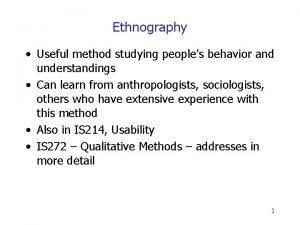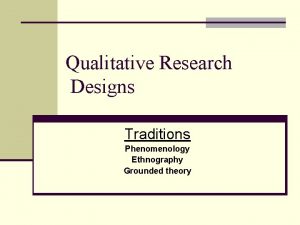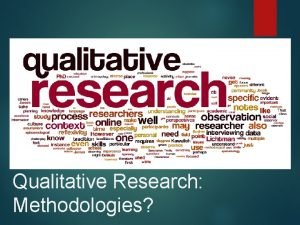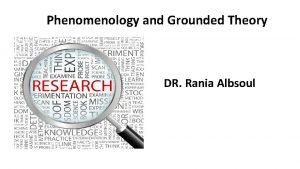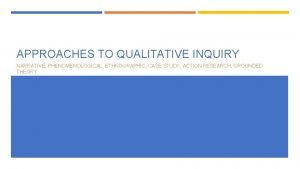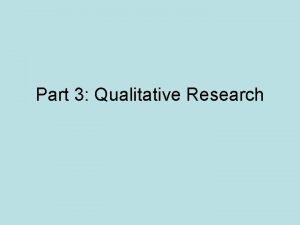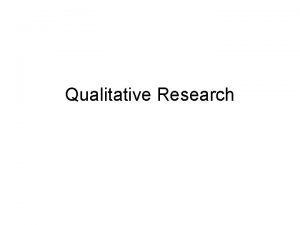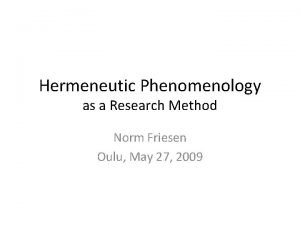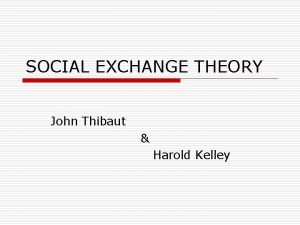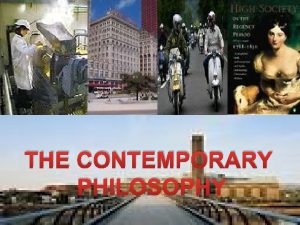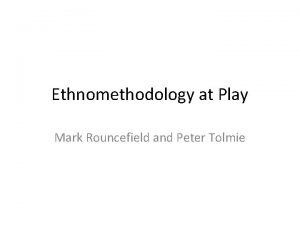Ethnomethodology and Phenomenology Outline What is ethnomethodology Harold















- Slides: 15

Ethnomethodology and Phenomenology

Outline • • What is ethnomethodology? Harold Garfinkel and Accounting Analysis of Institutional Settings Conversational Analysis Phenomenology Alfred Schutz Berger and Luckmann

What is ethnomethodology? • “the study of everyday methods that people use to live their daily lives” • ethno = relevant to your culture • method = how you use this knowledge

Harold Garfinkel (1917 - ) • U. S. sociologist • Ph. D. Harvard 1952 • Taught at U. C. L. A. – has become main training centre for ethnomethodologists • “Studies in Ethnomethodology” (1967) • Main intellectual influences: – Emile Durkheim (social facts) – Alfred Schutz (phenomenology) – Talcott Parsons (idea of social trust)

Garfinkel’s Ideas • Studied jurors and common sense knowledge • Placed primary importance on meanings that people give to everyday situations and how define their own situations • Developed ethnomethodology

Accounting • “Accounts” = stories that people tell to explain how they make sense of a situation and figure out what to do • “Accounting practices” = entire process • Ethnomethodologists analyze accounts and how accounts received by others • Accounts define individual reality • Emerge from individual’s meanings

Other Ideas • Breaching experiments – People act according to “commonsense” assumptions – When norms re: interactionare breached, a reaction occurs • Accomplishing gender – Gender more than just biology – You act according to what you believe is normal for your gender

Other Types of Ethnomethodology: Studies of Institutional Settings • Studies of institutional settings – police departments, courtrooms, hospitals – Go beyond tradtional sociological study of structures, roles, rules, and norms – How do individuals in a formal setting make sense of what they do and perform their jobs? – focus on interpretation and practical activity

Conversation Analysis • Includes: • Gathering of detailed conversational data – Verbal and non-verbal • • Documenting actor’s “method” Study of properties of an interaction Look at framework of conversation Management of the interaction

Importance of Ethomethodology • A social psychological approach concerned with individuals rather than roles and structures • Unlike symbolic interactionism, does not accept meaning “as is” – focus on how meaning is created – how do individuals use meanings to their direct action?

Phenomenology • The study of how social actors interpret social phenomena • How is our knowledge of the social world created? • A form of “social constructionism” • Our social reality is a socially constructed system of ideas which has accumulated over time and is taken for granted by individuals

Alfred Schutz (1899 -1959) • German social philosopher • Left Nazi Germany for U. S. • Taught at New School for Social research in NY 1952 – 1959 • Developed phenomenology by integrating social philosophy with Weber’s vershehen • Focus on the “life-world” and intersubjectivity • We bothcreate our life-world and are constrained by it • A dialectical process

Berger and Luckmann: The Social Construction of Reality (1966) • Written by Peter Berger and Thomas Luckmann • Berger studied under Schutz • One of most important phenomenological works • “processes by which any body of ‘knowledge’ comes to be socially accepted as ‘reality’ (Berger and Luckmann 1966)

The Social Construction of Reality (cont. ) • Everyday reality is a socially constructed system • People give order to everyday phenomena • Reality both subjective (personally meaningful) and objective (the social order) • Alienation = loss of meaning (disintegration of socially constructed knowledge system) • Goffman – actors learn and read “scripts” • Berger and Luckmann – actors improvise and create own scripts

The Social Construction of Reality (cont. ) • Dialectical process: – Externalization (individuals create social reality) i. e. creating a new friendship – Objectivation (perception of an ordered, prearranged reality) i. e. friendship becomes a social reality to actors and others – Internalization (constructed reality is internalized (institutionalized) and constrains individuals) i. e. the “friendship” places “demands” on each individual – Alienation occurs when individuals reify their social constructions (both roles and institutions) and become only “acted upon”
 Ethnomethodology and phenomenology
Ethnomethodology and phenomenology Ethnomethodology and ethnography
Ethnomethodology and ethnography Weakness of phenomenology
Weakness of phenomenology Phenomenology and ethnography
Phenomenology and ethnography Phenomenology examples
Phenomenology examples Ethnography and case study compare
Ethnography and case study compare Phenomenology vs case study
Phenomenology vs case study Phenomenology vs grounded theory
Phenomenology vs grounded theory Phenomenology vs ethnography
Phenomenology vs ethnography The lived
The lived Sampling in qualitative research
Sampling in qualitative research Phenomenology
Phenomenology Ethnography qualitative research
Ethnography qualitative research Hermeneutic phenomenology concept map
Hermeneutic phenomenology concept map Sentence outline example
Sentence outline example John thibaut dan harold kelley
John thibaut dan harold kelley

